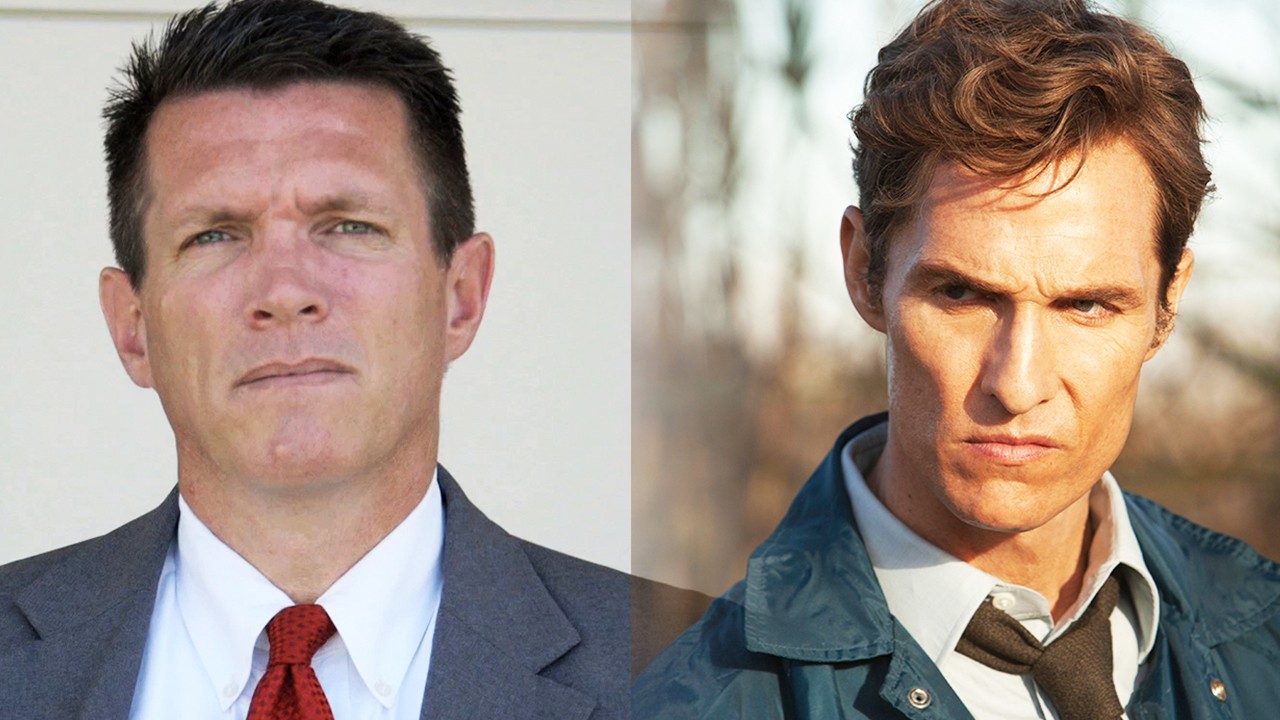Governor John Bel Edwards, left, and an inmate at Orleans Justice Center. (AP Photo/Melinda Deslatte)(AP Photo/Gerald Herbert)
Cammie Maturin got involved trying to change Louisiana's famously dysfunctional criminal justice system for two reasons. First, as a teacher, she was sick of seeing public schools short-changed while the state spent hundreds of millions in taxpayer money keeping the bloated prison system afloat. Second, she thinks that people can change and deserve a second chance, a philosophy glaringly absent in the only state that automatically denies any opportunity for parole in murder cases."Charles Manson gets consideration, but people in Louisiana don't?" she asks.And that's just people who were put away for violence. 86 percent of people sent to prison in 2015 were there primarily or solely for nonviolent offenses, according to the Louisiana Department of Corrections. It's hard to get students to take school seriously, Maturin says, when the state's message seems to be "that you'd rather see them incarcerated."Like many other activists, prisoners and lawmakers, Maturin hopes Governor John Bel Edwards's recently-announced reform package, based on recommendations offered last month by the Louisiana Justice Reinvestment Task Force, might put a dent in the state's incarceration rate, which is even higher than those in Texas and Florida. In fact, Louisiana carries the distinction of holding more people prisoner per capita than any country in the world. Even relatively conservative business groups like the New Orleans Chamber of Commerce, eager for fiscal sanity, are on board with reform, which in this case means lowering penalties for drug crimes and expanding who might be eligible for parole, among other changes.But tough-talking prosecutors, perhaps emboldened by the election of a loudly and consistently "law and order" president in Donald Trump, are standing in the way. The only question is if the frustration in some parts of the state at Louisiana's reputation for how horribly it treats suspected and convicted criminals can overcome its long penchant for nightmarish punishment."I would … encourage you to be alert to efforts to undermine the strength of our criminal laws by easing penalties or weakening criminal procedures," Baton Rouge District Attorney Hillar Moore III warns on his website. "In my 32 years-plus as a district attorney, I've never seen anything like this," Sabine Parish DA Don Burkett recently told NOLA.com. "I've never seen such an undertaking.""We're drawing a line at violent crime," Pete Adams, the Louisiana District Attorneys Association (LDAA) executive director, told the Times-Picyuane in mid-March. (Over email, Adams told me that this includes people who have been sentenced to die in prison for crimes they committed as juveniles.)This month, the LDAA drew a line in the sand, promising to fight reforms that "endanger the public or hinder the administration of justice." As the Times-Picayune reported, the group looks ready to contest or at least not back 18 of the 27 changes backed by the Governor. "Unfortunately, many of the Task Force recommendations go far beyond the group's mission and recommend release of murderers, armed robbers, rapists, and sex offenders," the LDAA wrote.But getting a shot at parole is not the same thing as getting paroled. "What you're talking about is not someone getting out, it's someone getting the opportunity to go before a parole board," State Public Defender Jay Dixon says. And going before a parole board isn't a guarantee of release—it just means that prisoners who have shown growth might get another shot.45-year old Bobby Wallace, who spent 22 years in Louisiana's infamous Angola prison, goes back to vouch in the parole hearings for the guys he thinks deserve a second chance. He doesn't understand why lawmakers who claim to be Christian seem to be so short on forgiveness. "Nobody knows what mercy is anymore," Wallace says. "Some of these [prisoners] … they're over 60 years old, 65 years old, they're geriatric. That's crazy."That most violent crimes are committed by young people—ages 16-24, according the federal Bureau of Justice—makes it tough for law and order types to argue prisoners who are released decades later are likely to re-offend.For his part, Wallace got 66 years in prison for an armed robbery he committed when he was 22. Half a lifetime later, at 45, he got out thanks to the 20/45 law that offered early release for prisoners over 45 who'd served over 20 years. Now he works as a counselor and wants to see more people have the same opportunity. Despite the usual difficulties of getting used to life on the outside, he's made it work. "'I'm a productive citizen," he says.Former prosecutor Marty Stroud has his own issues with the system. In 2015, he publicly apologized for putting an innocent man on death row—Glenn Ford spent 30 years in prison before he was exonerated. Despite Stroud's advocacy on his behalf, the state denied Ford money for the three decades he spent behind bars."Sentences are way too long," Stroud says. "The bail system is messed up, there's a problem with funding indigent defense… We put too many people in jail, and it doesn't solve the situation, it just increases our debt.""On some points we're little more than a banana republic," he adds.We tried to find the real 'True Detective' in Louisiana. That Louisiana has driven itself into a uniquely Kafka-esque hole of despair and suffering for alleged and convicted criminals alike is no secret—winning it major, award-winning coverage from national outlets and, at least under the Obama administration, scrutiny from the feds."We're outliers, everyone's looking at us like we're crazy," State public defender Dixon says. "The idea is to be more in line with the other Southern states, because we're not even there. I think there is a realization that we can't afford to do what we're doing."Dixon, who describes working as a public defender as "triage" due to the crushing caseloads and lack of funding, suspects that the way Louisiana prosecutes and jails people is so wasteful and expensive that it might actually have to change. After all, the state spends two-thirds of a billion dollars on corrections, the task force found. Yet the rate at which released prisoners end up back in the system suggests it's not exactly working in the public's best interest.Estimates from the task force say that if the recommendations are implemented, the state could save $305 million in the next decade."It's more a fiscal question now than it even is whether it's right or wrong," Dixon says.Stroud, the former prosecutor, commends the governor for embracing an ambitious reform agenda. But given the vibe emanating from his old colleagues, he's not exactly optimistic about meaningful reform getting through the legislature."The DAs usually win,' he says, "because everybody likes to beat their chest and say, "We want to be tough on crime."This story was reported with support from the Fair Punishment Project.Follow Tana Ganeva on Twitter.
That Louisiana has driven itself into a uniquely Kafka-esque hole of despair and suffering for alleged and convicted criminals alike is no secret—winning it major, award-winning coverage from national outlets and, at least under the Obama administration, scrutiny from the feds."We're outliers, everyone's looking at us like we're crazy," State public defender Dixon says. "The idea is to be more in line with the other Southern states, because we're not even there. I think there is a realization that we can't afford to do what we're doing."Dixon, who describes working as a public defender as "triage" due to the crushing caseloads and lack of funding, suspects that the way Louisiana prosecutes and jails people is so wasteful and expensive that it might actually have to change. After all, the state spends two-thirds of a billion dollars on corrections, the task force found. Yet the rate at which released prisoners end up back in the system suggests it's not exactly working in the public's best interest.Estimates from the task force say that if the recommendations are implemented, the state could save $305 million in the next decade."It's more a fiscal question now than it even is whether it's right or wrong," Dixon says.Stroud, the former prosecutor, commends the governor for embracing an ambitious reform agenda. But given the vibe emanating from his old colleagues, he's not exactly optimistic about meaningful reform getting through the legislature."The DAs usually win,' he says, "because everybody likes to beat their chest and say, "We want to be tough on crime."This story was reported with support from the Fair Punishment Project.Follow Tana Ganeva on Twitter.
Advertisement
Advertisement
The idea that murderers and rapists would be let loose on the streets of Louisiana is apparently a reference to the governor's proposed expansion of parole eligibility. Among other things, that change would help the state comply with the Supreme Court's Montgomery v. Alabama decision, designed to give prisoners who were sentenced to life without parole for crimes committed as juveniles another chance.
Advertisement
Advertisement

Advertisement
